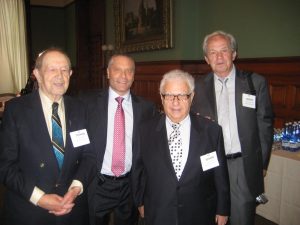Feature films and documentaries about the Holocaust are a staple of art house cinemas and festival circuits. Few titles, however, have approached the subject with as much irreverence as Ferne Pearlstein’s The Last Laugh.
A hit at Hot Docs earlier this spring, the documentary examines the subject of making jokes about the Holocaust. Once a taboo for comedians, humourous asides about Hitler, Anne Frank and gas chambers have become open season for the likes of Mel Brooks, Gilbert Gottfried and Sarah Silverman.
As Silverman says, “It’s important to talk about things that are taboo, because otherwise, they just stay in this dark place and become dangerous.”
Aided by the presence of those comic legends and a slew of raucous clips of stand-up and scripted routines, Pearlstein’s film looks at the fine line between funny and devastating, while also being devastatingly funny.
The Last Laugh will open the 25th anniversary of the Toronto Jewish Film Festival’s Chai Tea Series on Sunday, October 30.
The film screens at the Cineplex Empress Walk Cinemas, at 1:00 and 4:00 pm. A Skype Q&A with Pearlstein and producer Robert Edwards will follow both screenings.
READ: CANADIAN ACTOR STARS IN COMEDY ABOUT HOLOCAUST SURVIVORS
Various asides from the professional comedians have value. Interestingly, only a few years after the end of the Holocaust, Brooks was trying out Hitler-related barbs in the Catskills.
The doc also looks at how the separation of time helps make jokes on difficult subjects less outrageous.
When Brooks released his film debut The Producers, in 1968, the extended gag related to the faux Broadway musical “Springtime for Hitler” was considered daring. The Tony-winning musical adaptation of that film, staged in New York in 2001, received significantly less controversy.
As the comic legend testifies here, ridicule is “the Jewish way of getting through [tragedy].”
The most fascinating sections of The Last Laugh, surprisingly, aren’t the conversations with notable comics like Brooks and Carl Reiner.
The scenes with Holocaust survivor and educator Renee Firestone make us think about the limits of telling jokes that could be stunningly insensitive.
At the film’s start, Firestone talks about gallows humour as a tool of defiance to come to terms with tragedy. Later in the doc, when she watches YouTube clips of contemporary comics making reference to Nazis and Auschwitz, she bristles that a lot of the material isn’t funny.
Similarly, there is spirited (but not always positive) reaction from Holocaust survivors at a conference. Some explain that humour was a tool to ensure one had enough hope to get through the concentration camps, while others note that there wasn’t much to laugh about in that dismal setting.
The Last Laugh also features rare, black-and-white clips of Nazi cabarets and musical performances that took place in various concentration camps. Pearlstein speaks with Zdenka Fantlova, a Cabaret star at Terezin, who says she used that creative outlet to make jokes about the Nazi guards – although not in a language they could understand.
The intersection between flippant comedy and unthinkable tragedy is a fascinating one. Nevertheless, The Last Laugh would have been more intriguing with more debate between the popular comedians on the stage and the more sensitive survivors sitting in the audience.
Meanwhile, when the film begins looking at matters related to freedom of expression, such as comedian Lenny Bruce’s arrests for obscenity in the 1960s, it starts to lose its focus.
Still, the film resonates loudly in one extent: it destabilizes an idea of Holocaust survivors as perpetually altered by tragedy. While not all are charmed by the gallows humour, some are content to laugh along with the ridicule.






